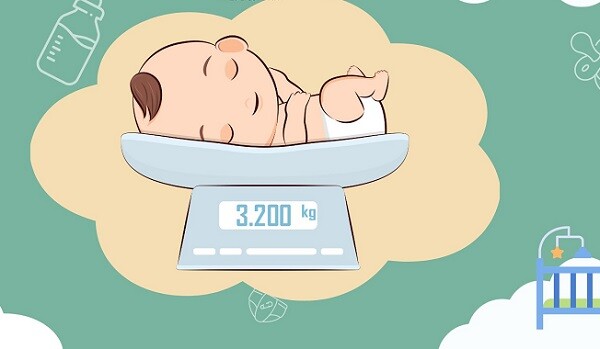

What’s the difference in IQ at birth between babies weighing over 3kg and 4kg?
What is the level of intelligence in babies weighing 3kg?
Numerous studies and data indicate that newborns weighing between 3kg and 3.5kg have the highest intelligence.
A study in Norway (on preterm infants) found that babies with higher birth weights tended to have the highest IQs at age 16.
For instance, Einstein weighed approximately 6.4kg at birth and is also the most representative example of a high IQ.
Why do newborns weighing 3kg – 3.5kg have an innate intellectual advantage?
According to experts, due to balanced nutrition in the womb, these babies are at a “golden equilibrium” for nutrient intake through the placenta, with optimal absorption of neuro-nutrients such as DHA and folic acid.
Secondly, their head circumference and body organs develop at a moderate rate, allowing for an easier birth through uterine contractions, which promotes brain and nervous system development.

Multiple studies and data indicate that newborns weighing between 3kg and 3.5kg have the highest intelligence.
In the case of low birth weight babies, under 2.5kg, or high birth weight babies, over 4kg, this can negatively impact their IQ.
– If a baby weighs less than 2.5kg, the folds of the cerebral cortex are significantly reduced, and their ability to absorb nutrients is insufficient, requiring careful nourishment.
– On the other hand, higher birth weights, over 4kg, are associated with excessive insulin-like growth factors, which can inhibit neural plasticity. The excessive nutrient intake puts strain on the body’s organs, particularly the respiratory system and metabolism, which may impact brain development.
So, what’s the difference in IQ for babies over 4kg? Should parents be concerned if their baby is born overweight?
If the mother has overnutrition during pregnancy and the baby absorbs nutrients well, or if one of the parents has a larger baseline weight, the baby may inherit these factors.
Although experts warn of potential health issues in newborns weighing over 4kg, intelligence is not static and can change at any moment.
Data analysis shows that the average IQ of newborns weighing over 4kg is 2.1 points lower than those weighing 3-3.5kg (within the normal weight range). However, by age 7, this gap narrows to 0.8 points, indicating the influence of upbringing and environment.
In reality, an average IQ falls within the normal range of 90-110, so parents need not worry excessively about this issue.
Weight is not the sole indicator of a child’s intelligence. Maternal diet during pregnancy, genetics, living environment, and postnatal care all play crucial roles in a child’s development.
Therefore, while monitoring a newborn’s weight is essential, it’s also important to consider other factors such as motor skill development, communication abilities, and social interaction. Together, these elements contribute to a child’s overall health and intelligence.

Higher birth weight increases the risk of obesity later in life.

Key factors influencing a child’s IQ development
As mentioned earlier, the impact of weight on IQ is only a small part of the equation.
While IQ is partly determined by genetics, it is also influenced by parental upbringing. There are several factors that can significantly improve IQ, which parents should monitor.
Early language interaction, the cheapest “smart drug”
At birth, 700 to 1,000 neural connections are formed every second. During this critical period, parental language is the best form of education to stimulate brain development.
Neuroscience experts assert that the best education is free and present in every word, sentence, conversation, and interaction with parents.
Interactive conversations between parents and children promote brain development, and rich language stimulation enhances neural circuits in the brain associated with language, memory, and logic.

Early language interaction is considered the “smart drug.”
A Stanford University study found that children with a richer vocabulary at 24 months scored higher on IQ tests at age 5.
This is because children enrich their concept formation during conversations with their parents, such as “red apple” and “fragrant flower,” thus forming a rich network of concepts.
Additionally, causal expressions in conversations, such as “Open the umbrella because it’s raining,” activate logical reasoning in the prefrontal cortex, responsible for thinking and decision-making.
The more children use their brains, the smarter they become. Continuous language stimulation enriches their language system, enhances cognition, and improves their thinking abilities.
Exercise changes the brain
Scientists have identified the “exercise effect,” which means that physical activity makes children healthier and directly changes their brain structure, improving cognitive abilities, learning efficiency, and emotional regulation.
Why is this? Exercise promotes the release of “growth factors” in the brain and enhances neural plasticity.
A child’s early movements, such as rolling, crawling, and walking, shape their brain structure through action-cognition cycles.
Therefore, allowing children to experiment, explore, crawl, walk, jump, play outdoors, and engage in sports significantly promotes brain development.

Exercise changes the brain.
Even as children grow older, maintaining a certain level of daily physical activity optimizes brain function and improves cognitive abilities.
A German study found that the efficiency of learning new words among 9-10-year-old children increased by 30% after 20 minutes of brisk walking.
Additionally, the “20-minute rule” of moderate daily exercise and avoiding prolonged sitting is beneficial for brain improvement.
Furthermore, unstructured games like tag stimulate the brain’s default mode network, enhancing problem-solving abilities.
Close and affectionate parenting improves brain development
In a safe and loving environment, a child’s nerves myelinate faster, encouraging exploration and learning.
Children who receive sufficient love and grow up in a secure environment tend to thrive physically and mentally. Love lays the foundation for emotional development and self-confidence.
Conversely, children who live in a prolonged “alert state” and continuously release the stress hormone cortisol form numerous synaptic connections in the prefrontal cortex, leading to distractibility.

































